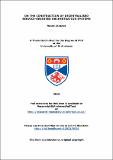Files in this item
On the construction of decentralised service-oriented orchestration systems
Item metadata
| dc.contributor.advisor | Barker, Adam David | |
| dc.contributor.author | Jaradat, Ward | |
| dc.coverage.spatial | xxiii, 286 p. | en_US |
| dc.date.accessioned | 2016-01-18T12:29:53Z | |
| dc.date.available | 2016-01-18T12:29:53Z | |
| dc.date.issued | 2016-06-22 | |
| dc.identifier | uk.bl.ethos.678188 | |
| dc.identifier.uri | https://hdl.handle.net/10023/8036 | |
| dc.description.abstract | Modern science relies on workflow technology to capture, process, and analyse data obtained from scientific instruments. Scientific workflows are precise descriptions of experiments in which multiple computational tasks are coordinated based on the dataflows between them. Orchestrating scientific workflows presents a significant research challenge: they are typically executed in a manner such that all data pass through a centralised computer server known as the engine, which causes unnecessary network traffic that leads to a performance bottleneck. These workflows are commonly composed of services that perform computation over geographically distributed resources, and involve the management of dataflows between them. Centralised orchestration is clearly not a scalable approach for coordinating services dispersed across distant geographical locations. This thesis presents a scalable decentralised service-oriented orchestration system that relies on a high-level data coordination language for the specification and execution of workflows. This system’s architecture consists of distributed engines, each of which is responsible for executing part of the overall workflow. It exploits parallelism in the workflow by decomposing it into smaller sub-workflows, and determines the most appropriate engines to execute them using computation placement analysis. This permits the workflow logic to be distributed closer to the services providing the data for execution, which reduces the overall data transfer in the workflow and improves its execution time. This thesis provides an evaluation of the presented system which concludes that decentralised orchestration provides scalability benefits over centralised orchestration, and improves the overall performance of executing a service-oriented workflow. | en_US |
| dc.language.iso | en | en_US |
| dc.publisher | University of St Andrews | |
| dc.subject | Service-oriented architecture | en_US |
| dc.subject | Decentralised orchestration | en_US |
| dc.subject | Data-centric workflows | en_US |
| dc.subject | Partitioning | en_US |
| dc.subject | Network resource monitoring | en_US |
| dc.subject | Computation placement analysis | en_US |
| dc.subject.lcc | TK5105.5828J2 | |
| dc.subject.lcsh | Service-oriented architecture (Computer science) | en_US |
| dc.subject.lcsh | Electronic data processing--Distributed processing | en_US |
| dc.subject.lcsh | Computer networks--Monitoring | en_US |
| dc.subject.lcsh | Workflow management systems | en_US |
| dc.title | On the construction of decentralised service-oriented orchestration systems | en_US |
| dc.type | Thesis | en_US |
| dc.type.qualificationlevel | Doctoral | en_US |
| dc.type.qualificationname | PhD Doctor of Philosophy | en_US |
| dc.publisher.institution | The University of St Andrews | en_US |
This item appears in the following Collection(s)
Items in the St Andrews Research Repository are protected by copyright, with all rights reserved, unless otherwise indicated.

